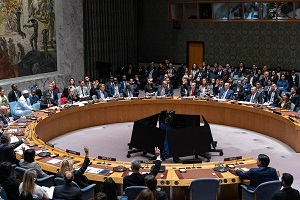The return of the mandate to Palestine in an American guise - By Hasan Dajah, The Jordan Times
The Jordan Times
The attempts to liquidate the national rights of the Palestinian people and reshape reality through projects lacking genuine international legitimacy constitute a blatant violation of several principles consistent with the UN Charter and international human rights law.
Therefore, it is no exaggeration to say that these projects are a "disgrace to humanity." A people struggling for self-determination, whose land is violated and whose fundamental international laws are trampled upon, cannot accept any temporary settlement or guiding recommendation that compromises their right to liberation from occupation and the establishment of their independent state.
The following are the most prominent international articles and resolutions upon which the Palestinian right to self-determination and an end to the occupation is based, with their application to the Palestinian situation:
First, it must be noted that the UN Charter includes the principle of “self-determination of peoples” among its objectives. Article 1, paragraph 2 of the UN Charter refers to “the development of friendly relations among nations based on respect for the principle of equal rights and self-determination of peoples.” Article 55 also emphasizes the need for the United Nations to ensure “a certain standard of living, whether economic or social,” in accordance with “the human right to live in freedom.” Therefore, the principle of self-determination is not a choice but an international obligation.
Second, the General Assembly adopted the “Declaration on the Granting of Independence to Colonial Countries and Peoples” (A/RES/1514(XV)), which stipulated that “all peoples have the right to self-determination; by virtue of this right they freely determine their political status and freely exercise their economic, social and cultural status.” Similarly, Resolution 7420 (VIII) of 1952, concerning the right of peoples to self-determination, states that “Members of the United Nations recognize the principle of the right of peoples and nations to self-determination.”
Third, with regard specifically to the Palestinian people, the United Nations General Assembly has adopted several resolutions:
Resolution A/RES/3236 (XXIX), adopted on 22 November 1974, which recognized that the Palestinian people “have the right to self-determination” and “have the right to independence and national sovereignty.”
Resolution A/RES/67/158 (26 February 2013) on “the right of the Palestinian people to self-determination.”
Resolution A/RES/79/163 (19 December 2024), which reaffirms more than ever “the right of the Palestinian people to self-determination, including their right to an independent State of Palestine.” Fourth, among the important Security Council resolutions are:
Resolution S/RES/242 of 22 November 1967, which rejected the acquisition of territory by war and called for “the withdrawal of Israeli armed forces from territories occupied in the recent conflict” and “respect for and recognition of the recognized boundaries and security of every State in the region.”
Resolution S/RES/2334 of 23 December 2016, which stressed that the Israeli settlement policy in the Palestinian territories occupied since 1967, including East Jerusalem, is a violation of international law and has no legal validity.
These resolutions constitute a clear international legal precedent: that the rights of the Palestinian people to self-determination, to establish their independent state, and to end the Israeli occupation of the occupied territories, including East Jerusalem, are inalienable rights that cannot be relinquished, and that any plan or agreement that does not pave the way for this is contrary to international law.
Therefore, the plans and proposals currently being presented (including what is known as the Trump plan for the Gaza Strip) constitute a violation of these international obligations. When it is proposed that an area remain under external trusteeship or containment, or be administered by occupying powers, without a full withdrawal in accordance with Resolution 242 and the cessation of settlement activity in accordance with Resolution 2334, this amounts to submission to the reality of the occupation, not its end, and thus a betrayal of the Palestinian people's right to self-determination and their national rights.
The Palestinian people have not struggled for decades to have their existence redefined under trusteeship, nor to have the occupation replaced by new forms of administration over them or any part of their land. Rather, they have struggled to end this occupation and establish a fully sovereign Palestinian state, living in freedom and security alongside the State of Israel, in accordance with the principle of "two states for two peoples." This is what international resolutions affirm as the framework for a just and lasting solution. Any settlement that does not prioritize the complete withdrawal of the occupation, the dismantling of settlements, the implementation of the right of return or compensation for refugees, and full recognition of the establishment of an independent Palestinian state is merely a cosmetic change to the occupation or an attempt to distort the legitimate right.
It can be argued that international law—through the Charter and through the resolutions of the General Assembly and the Security Council—establishes and affirms the Palestinian people's right to self-determination, that the Israeli occupation of the occupied territories constitutes a violation of this right, and that the realization of an independent Palestinian state within the 1967 borders is a fundamental condition for any just and lasting peace. Therefore, any attempt to impose alternative or compromise solutions without addressing the core of the occupation and the violation of the right to self-determination remains a departure from this framework and these laws, and silence or participation in such attempts is a disgrace to the human conscience.
Hasan Dajah is professor of strategic studies at Al-Hussein Bin Talal University
Latest News
-
 Spain PM announces $710 million in military aid for Ukraine
Spain PM announces $710 million in military aid for Ukraine
-
 Prime minister reiterates centrality for Palestinian cause for Jordan
Prime minister reiterates centrality for Palestinian cause for Jordan
-
 Trump to meet Saudi Crown Prince on Tuesday
Trump to meet Saudi Crown Prince on Tuesday
-
 UN Security Council adopts US resolution on Gaza peace plan
UN Security Council adopts US resolution on Gaza peace plan
-
 Jordan condemns Israeli minister’s calls to target Palestinian leadership
Jordan condemns Israeli minister’s calls to target Palestinian leadership